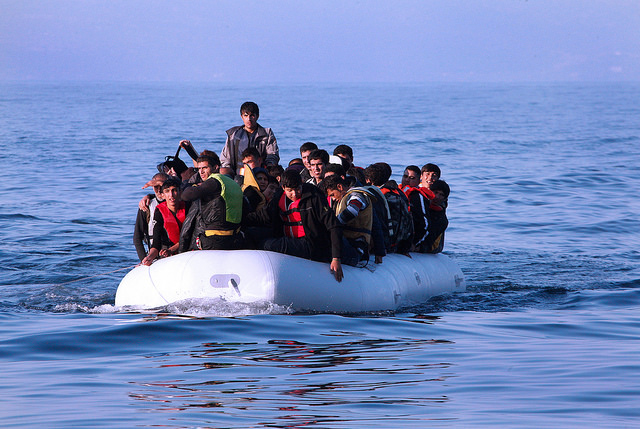The EU-Turkey Refugee Deal is Impossible (At Best)

President of the European Commission Jean-Paul Juncker, when the European Union announced its recently-struck deal with Turkey on the topic of refugees, proudly proclaimed that the deal “respects all European Union and international norms.” If only that were so. In fact, the best that could be said for the deal that recently entered into force is that if it is to be carried out in accordance with international law, it is impossible to implement. The deal can either be in accordance with international law, or it can be implemented. It cannot be both. Indeed, it may very well be neither.
To understand why this is, one needs to bear a few facts in mind. The first is the content of the deal itself. In exchange for €6 billion through 2018, entry into the Schengen Treaty and the “acceleration” of talks to accede to the European Union, Turkey will house the so-called “irregular migrants” currently crossing the Aegean to Greece, swapping them for refugees in Turkey on a one-to-one basis. Turkey, in short, becomes the detention area for asylum seekers who attempt to cross into Greece.
Next is Protocol 4, Article 4 of the European Convention on Human Rights, which reads: “Collective expulsion of aliens is prohibited.” So far, so unambiguous. Parties to the Convention may not expel whole groups of people on the basis of that grouping. The deal, however, calls for the expulsion of those who have come to Greece seeking asylum – which is to say that they have arrived in Greece and applied to stay – in a one-to-one exchange with refugees who have already been processed in Turkish refugee centers. As has been pointed out by human rights groups opposed to the deal, it is difficult, if not impossible, to square the principle that each individual case be assessed on its own merits with the use of asylum-seekers as commodities. Either each case is evaluated independently, or treated as a collective unit to be traded.

On its face, as Human Rights Watch has written, the deal amounts to the collective deportation of refugees, Syrians especially, from temporary facilities in the Aegean back to Turkey, based only on the fact that they had entered the country illegally and ignoring the fact they do so with claims of asylum that are legitimate enough to be accepted at a 98% rate according the EU’s own records. Moreover, it isn’t as though the legal difficulties of the deal were lost on those negotiating it. German Chancellor Angela Merkel conceded as much when she anticipated that the deal would face “legal obstacles.” When one of the primary mechanisms of action in the deal is centered upon a system that, in order to have any meaningful effect, would violate established international law, “obstacles,” seems like something of an understatement.
Even were one to assume that the legal hurdles could be overcome in practice, it may even be impossible for the European Union to actually implement the deal. Consider that 98% statistic from the previous paragraph. If the effect of the deal in exchanging asylum-seekers for refugees is to be anything other than marginal, it will have to either affect more than the 2% of those who do not have legitimate grounds for asylum, or it will have to expel those who have legitimate grounds, a clear violation of the principle of non-refoulement articulated in Article 33 of the Convention Relating to the Status of Refugees.
These violations of well-established principles of international law have material consequences. In yet more bad news for the deal, the United Nations High Commissioner for Refugees (UNHCR) has announced that it will not provide staff and support to “detention facilities” in the Aegean because of the terms of the deal. This is particularly embarrassing to proponents of the deal not only because UNHCR assistance is greatly needed, but also because its support was assumed in the text of the deal, without the UN ever having been consulted on that point. They aren’t alone. Medecins Sans Frontieres has likewise scaled down its operations, fearing complicity in a system of detention and deportation that it considers unjust.

But there are of course those for whom the normative constraints of international law are not as compelling. If Europe faces a severe enough crisis to necessitate dramatic action, so be it. Without digging into the underpinnings of this sort of thinking too deeply, even those who follow it have good reason to oppose the deal. Turkey is not, after all, agreeing to house significant numbers of Europe-bound refugees for nothing. In addition to 6 billion euros in payments to the Turkish government, Turkey gains two significant political concessions: access to the Schengen Treaty’s open-border area and an “acceleration” of proposed accession talks to the Union itself – long a Turkish foreign policy objective. Turkish accession to the EU in principle is a difficult topic in its own right, and merits its own separate analysis, but suffice it to say that the timing could not possibly be worse in terms of the Erdogan government’s horrific record of human rights abuses, let alone its highly checkered contributions to peace in Syria. That a country that still shuts down opposing newspapers and cracks down on political opponents with no clear sign of improvement could be granted significant – if symbolic, as actual accession remains exceedingly unlikely – concessions speaks not of political savvy, but of desperation. It is difficult to see how this would do anything other than embolden an already-brazen Erdogan to further consolidate power with Europe’s tacit consent.
To those who think this overly alarmist, consider the paucity of even the best-case scenario. It is, of course, thoroughly possible that no, or at the very least very few, asylum seekers will actually be deported and denied their right to appeal for asylum. It is possible that an elaborate infrastructure will be created that can both supervise the flow of refugees and even do so in a way that upholds the rights of those refugees in spite of the absence of UNHCR and MSF. It is possible that Erdogan will not make any further moves towards authoritarianism, the concessions that he was given being too symbolic to be of much practical use to him.
All this is possible, yes, but even in the best case, what will Europe have gained? A marginal reduction of refugees currently in Greece? Closer ties with a country whose government only arguably shares its values and interests? Suppose the effect isn’t marginal, and legally-protected asylum seekers are deported en masse into the arms of a country with even less respect for human rights than the one who is willing to violate international law to have them deported. Greece, Bulgaria, and the insurgent anti-refugee right will be appeased, and Europe will have a strongman on its border, capable of exacting further concessions by rehashing the refugee question. Europeans must ask themselves: is that worth it?
